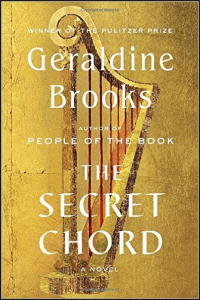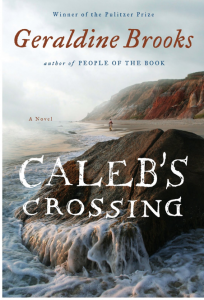 Handel’s Coronation Anthems begin with the words “Zadok the Priest, and Nathan the Prophet, anointed Solomon King” and well might the people have rejoiced. Solomon succeeded King David, described in Geraldine Brooks’ retelling of his story “The Secret Chord” as the difficult, tempestuous, musical, brave killer of Goliath and later King of the Israelite tribes. Brooks drew on the Bible and numerous other sources to develop her version of this Biblical figure. One of her many interesting choices is to tell the story from the point of view of Nathan, who served David as prophet and advisor since Nathan’s childhood.
Handel’s Coronation Anthems begin with the words “Zadok the Priest, and Nathan the Prophet, anointed Solomon King” and well might the people have rejoiced. Solomon succeeded King David, described in Geraldine Brooks’ retelling of his story “The Secret Chord” as the difficult, tempestuous, musical, brave killer of Goliath and later King of the Israelite tribes. Brooks drew on the Bible and numerous other sources to develop her version of this Biblical figure. One of her many interesting choices is to tell the story from the point of view of Nathan, who served David as prophet and advisor since Nathan’s childhood.
Readers will know the outlines – David, a shepherd bringing food to his brothers fighting with King Saul’s army against the Philistines, killed Goliath, the giant champion of the Philistines. Saul brings David into his household, and David and Saul’s son Jonathan form a deep, and in Brooks’ version most likely sexual, friendship. Eventually David rebels against Saul, defeats his army, and succeeds him. (One of the saddest and most beautiful pieces of music is Charpentier’s opera “David et Jonathas”; you can listen to Les Arts Florissants’ beautiful staging of the scene where David learns of Jonathan’s death here.) David takes several women as wives, who give birth to several sons, including Amnon and Absalom, and a daughter, Tamar. He upends his life when he spies the beautiful wife of one of his generals, Batsheva. She gives birth, eventually, to the son who grows up to be King Solomon, but David and his other children (and wives) pay an enormous price (Batsheva’s first-born son dies; Amnon rapes and disfigures Tama; Absalom kills Amnon and ultimately dies a gruesome death).
Brooks takes a clear-eyed view of David. The good, of which there was much, was very good: David united the tribes, took a deep and abiding interest in his people, exercised good judgment when he decided disputes. But the bad was very bad: over and over, Nathan tells us, David, or his henchmen, does whatever is necessary to wrest power from his adversaries, and to secure it. This generally means killing, and more killing, often of women, old men, and children as much as the men of the armies. Nathan retires as much as possible from his court, undertaking, among other tasks, to tutor and protect Solomon.
Brooks has chosen well in making Nathan the narrator. He cannot, he says, control or predict the visions he is sent by God, but he can remember and interpret them, and David trusts Nathan’s visions, as does the reader. It’s a small further step to believe Nathan’s version of events he did not or could not witness. David composed many of the psalms, and his songs, his musicianship when he plays the harp, and other music regularly illustrate David’s best qualities (the novel takes its title from the song by Leonard Cohen). Brooks is at her best in describing the smaller spaces — villages, palaces, tents and houses and the events within them are all deeply vivid, as are the minds and, occasionally, the dress of her characters. The larger movements, of individuals and especially of the armies that sweep through, are hard to follow, and the maps that cover the endpapers are not detailed enough to help.
Using such an old story, one that has been told and adapted by countless artists whose works have their own resonance for each reader, is a risk, one that Brooks has met and overcome. “The Secret Chord” is an engaging and interesting take on a historical figure whose acts and life are the stuff of myth. Do you agree? Let us know in the comments.
Have a book you want me to know about? Email me at asbowie@gmail.com. Follow me on twitter @abowie917.

